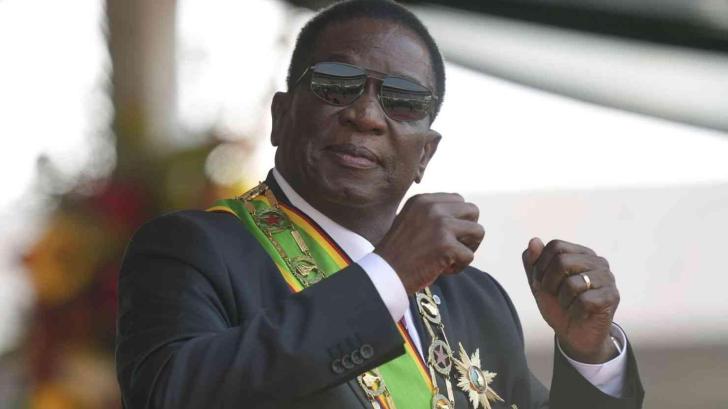News / National
Mnangagwa touches off storm over US deportations
3 hrs ago | Views

President Emmerson Mnangagwa has caused a stir after publicly backing United States President Donald Trump's decision to deport over 500 undocumented Zimbabweans, as part of the Trump administration's broader mass deportation initiative. Mnangagwa's statement came amidst a heightened crackdown on illegal immigration under Trump's policies, which continue to target non-citizens residing unlawfully in the US.
In a post on X, Mnangagwa expressed support for the US government's decision, stating: "The government of Zimbabwe supports the United States government's decision to repatriate and return our Zimbabwean citizens who may have been residing in the US illegally." His comments come as part of a larger push to deport 1,445,549 non-citizens under a US Immigration and Customs Enforcement (ICE) programme that has been ongoing since November 2022. At least 545 Zimbabweans are among those targeted for removal.
Zimbabwe has previously faced similar deportation challenges, most notably from the United Kingdom, which has also deported Zimbabweans found to be living illegally in the country or who overstayed their visas. Between 2020 and 2023, the UK deported several Zimbabwean nationals as part of its efforts to enforce immigration laws. This included a charter flight in 2021 carrying 14 Zimbabwean nationals back to Harare, which sparked outrage from human rights groups.
Human rights organisations and activists have condemned these deportations, especially considering Zimbabwe's ongoing economic and political challenges. They argue that returnees could face considerable hardships reintegrating into a society marked by high unemployment, inflation, and limited social services.
Pardon Taodzera, a political analyst, commented on the situation, stating, "The recurring theme of deportations underscores the desperation of many Zimbabweans, who leave the country due to economic hardships. While host countries have the right to enforce their immigration laws, there is a need for a more compassionate approach, especially when dealing with individuals fleeing dire circumstances."
Legal expert Aaron Hamauswa warned that the deportations could exacerbate Zimbabwe's socio-economic challenges. "Returning citizens will need significant support to reintegrate into society. Without proper mechanisms in place, we risk creating a cycle of poverty and displacement," he said.
Local Government and Public Works Minister Daniel Garwe also weighed in on the issue, supporting the deportations, and suggesting that those who were deported for opposing Zanu-PF should return home and contribute to the country's development. He argued that the deportations were ultimately beneficial for Zimbabwe.
However, critics have pointed out that the root causes of migration - such as unemployment and poor governance - need to be addressed to prevent citizens from seeking opportunities abroad in the first place. People's Unity Party leader Herbert Chimuka remarked, "The government must address the root causes of migration to prevent citizens from leaving in the first place."
Despite the controversy surrounding the deportations, Zimbabweans living in the diaspora continue to play a crucial role in the country's economy. Reserve Bank of Zimbabwe Governor John Mushayanhu has noted that remittances from Zimbabweans abroad contribute 17% to the nation's foreign currency inflows.
As the debate over deportations continues, it remains clear that the issue highlights the economic challenges faced by Zimbabweans both at home and abroad.
In a post on X, Mnangagwa expressed support for the US government's decision, stating: "The government of Zimbabwe supports the United States government's decision to repatriate and return our Zimbabwean citizens who may have been residing in the US illegally." His comments come as part of a larger push to deport 1,445,549 non-citizens under a US Immigration and Customs Enforcement (ICE) programme that has been ongoing since November 2022. At least 545 Zimbabweans are among those targeted for removal.
Zimbabwe has previously faced similar deportation challenges, most notably from the United Kingdom, which has also deported Zimbabweans found to be living illegally in the country or who overstayed their visas. Between 2020 and 2023, the UK deported several Zimbabwean nationals as part of its efforts to enforce immigration laws. This included a charter flight in 2021 carrying 14 Zimbabwean nationals back to Harare, which sparked outrage from human rights groups.
Human rights organisations and activists have condemned these deportations, especially considering Zimbabwe's ongoing economic and political challenges. They argue that returnees could face considerable hardships reintegrating into a society marked by high unemployment, inflation, and limited social services.
Pardon Taodzera, a political analyst, commented on the situation, stating, "The recurring theme of deportations underscores the desperation of many Zimbabweans, who leave the country due to economic hardships. While host countries have the right to enforce their immigration laws, there is a need for a more compassionate approach, especially when dealing with individuals fleeing dire circumstances."
Local Government and Public Works Minister Daniel Garwe also weighed in on the issue, supporting the deportations, and suggesting that those who were deported for opposing Zanu-PF should return home and contribute to the country's development. He argued that the deportations were ultimately beneficial for Zimbabwe.
However, critics have pointed out that the root causes of migration - such as unemployment and poor governance - need to be addressed to prevent citizens from seeking opportunities abroad in the first place. People's Unity Party leader Herbert Chimuka remarked, "The government must address the root causes of migration to prevent citizens from leaving in the first place."
Despite the controversy surrounding the deportations, Zimbabweans living in the diaspora continue to play a crucial role in the country's economy. Reserve Bank of Zimbabwe Governor John Mushayanhu has noted that remittances from Zimbabweans abroad contribute 17% to the nation's foreign currency inflows.
As the debate over deportations continues, it remains clear that the issue highlights the economic challenges faced by Zimbabweans both at home and abroad.
Source - newsday









































